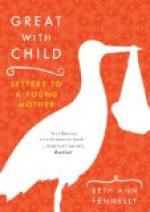There are some mothers who seem to have a perfect hatred of children; and if they can find any plausible apology for neglecting to nurse them, they will. Few, indeed, will publicly acknowledge a state of feeling so unnatural; but there are some even of such. On the latter, all argument would, I fear, be utterly lost. Of the former, there may, be hope.
They tell us—and they are often sustained by those around them—that it is very inconvenient to be so confined to a child that they cannot leave home for a little while. Can it be their duty—for in these days, when virtue and religion, and everything good, are so highly complimented, no people are more ready to talk of duty than they who have the least regard to it—can it be their duty, they ask, to exclude themselves from the pleasures and comforts of social life for half or two thirds of their most active and happy years? Ought they not to go abroad, at least occasionally? But if so, and their children have no other source of dependence, must they not suffer? Is it not better, therefore, that they should be early accustomed to other food, for a part of the time? Besides, they may be sick; and then the child must rely on others; and will it not be useful to accustom it early to do so?
Perhaps few mothers are conscious that this train of reasoning passes through their minds. But that something like it is often made the occasion of substituting food which is less proper, for that furnished by Divine Providence, there cannot be a doubt. And the mischief is, that she who has gone so far, will not scruple, ere long, to go farther. And, strange and unnatural as it may seem, that mothers should turn over their children to be nursed wholly by others, in order to get rid of the inconvenience of nursing them at their own bosoms, it is only carrying out to its fullest extent, and reducing to practice, the train of reasoning mentioned above.
Nor is it necessary that I should stop here to denounce a course of conduct so unchristian and savage. I know it is very common in some countries; and those American mothers who ape the other eastern fashions, or countenance their sons and daughters in doing it, will not be slow to imitate this also—especially as it is a very convenient fashion. And I question whether I shall succeed in reasoning them out of it. Habit, both of thought and action, is exceedingly powerful. I will, therefore, confine myself chiefly to those efforts at prevention, from which much more is to be hoped, in the present state of society, than from direct attempts at cure.
It will be soon enough to leave a child with another person, when the mother is actually sick, or unavoidably absent; or when some other adequate cause is known to exist. We are to be governed, in these and similar cases, by general rules, and not by exceptions. The general rule, in the present case, is, that mothers can nurse their own children; and, if they have the proper disposition, that they can do it uninterruptedly.




